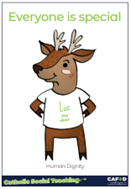It holds that God has a special plan for every single one of us, whoever we are. Our part in this plan isn’t just limited to things ‘spiritual’, or times when we do ‘religious things’. It involves every aspect of our lives, from the things we pray about, to how we live as a responsible global citizen.
Our part in this story is a kind-of vocation for the common good, a call to treat everyone as our brothers and sisters. It is something that we all share.
The Catholic Church has seven principles of social teaching that we share with our children through all that we do, through the curriculum, special events and activity and through our ordinary actions in school.
There are 7 principles of Catholic Social Teaching, we are called to uphold them.

Sharing God’s world: protecting the poor
How do pupils share at home and at school? What are the kinds of things that are shared? Should everyone get exactly the same? Should some people get more? Why? For example, families with more children might need more resources, or someone with a disability might need extra help.

Human Dignity
‘What makes me special?’ ‘What makes people special? ‘How should we treat each other?’ Who is not treated as special and how can we help people to consider them with dignity?

Stewardship: Caring for God’s World
How do I show respect for Creation? The earth and all life on it are part of God’s creation. We are called to respect this gift. We are responsible for taking care of the world we live in and for sharing all the wonders and resources the earth gives us.

The Common Good
What is ‘true community’? The common good is reached when we work together to improve the well-being of people in our society and the wider world.

Solidarity
Who are our leaders? How do we stand with others? How did Jesus show service and justice?

Participation
When can we participate/join in or even lead the way that results in change or improvement for others?

Promoting Peace
How do our actions affect others? Do we lead by example? Do our words and actions lead to harmony? Do we act and give help to others when we see that peace has been broken?
Catholic Social Teaching is woven through many subjects, such as: History, Geography and English. It is not taught just in RE. Many of our assemblies feature Catholic Social Teaching, as we discuss world events and how our faith challenges us to respond in a particular way.
We teach our children to be thoughtful about and challenging of the world’s organisations and communities; we must work together to build a better world for the future.

